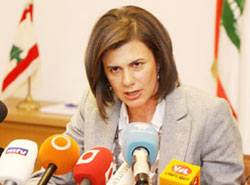 Lebanon may sell new Eurobonds this year and roll over existing debt to help finance a proposed jump in fiscal spending that would push the budget deficit to a record, said Finance Minister Raya Haffar el-Hassan.
Lebanon may sell new Eurobonds this year and roll over existing debt to help finance a proposed jump in fiscal spending that would push the budget deficit to a record, said Finance Minister Raya Haffar el-Hassan.
“We are adopting an expansionary budget that is going to be financed from revenues that are increasing as a result of growth and minor measures we took on the revenue side and by higher debt,” Hassan said in an interview at her office in Beirut yesterday.
The draft 2010 budget sent to the cabinet last week included a 15.5 percent increase in spending and a deficit forecast at $4 billion, or 10.7 percent of gross domestic product, compared with 8.6 percent last year. The cabinet has yet to discuss the proposals, which must also go to parliament for approval.
The potential Eurobond sale would be on top of any rollover of $700 million of Eurobonds that mature in November, Hassan said. Lebanon has already sold $1.2 billion of 10-year Eurobonds this year with an interest rate of 6.375 percent, to refinance debt that matured in March. She didn’t give details of how big an additional bond sale would be or when.
Prime Minister Saad Hariri’s government, which was formed in November, has to finance public debt that reached $52 billion at the end of February, or about 147 percent of GDP. Lebanon accumulated the debt as it rebuilt the country after a 15-year civil war that ended in 1990 and a monthlong conflict with Israel in 2006.
Economic Growth
The country can manage rising public debt and finance a wider fiscal deficit as long as the economy grows at a faster pace than its debt, Hassan said.
“There has to be growth, that’s the axis of our debt reduction strategy,” she said.
Lebanon’s economy expanded 9 percent last year and 8.5 percent in 2008. The economy will grow at least 4.5 percent this year, she said.
In the longer term, the government will have to sell state- owned companies to reduce the national debt, which is projected to reach $55 billion this year, Hassan said.
“If that doesn’t happen then the likelihood of reducing the stock of debt as it stands today is not very large,” she said.
Asset Sales
Plans to sell two state-owned mobile phone operators, which previous governments had hoped would raise as much as $7 billion, were put on hold because of an 18-month political crisis that eased in May 2008 and later by the global credit crisis and parliamentary elections in June of last year. Restructuring the state-owned power company, Electricite du Liban, which cost the government $1.5 billion in subsidies last year, has also been delayed.
The sale of the two mobile operators is unlikely to take place this year, Hassan said.
Capital inflows that led to bank deposits soaring about 22 percent last year may decline by as much as half this year as the global economy recovers and interest rates begin to climb worldwide, Hassan said.
Lebanese banks received more than $1.5 billion a month from abroad in 2009 as they kept interest rates on deposits in Lebanese pounds at about 7 percent, while rates elsewhere in the world tumbled. The inflow of funds enabled commercial banks to finance the fiscal deficit and the central bank to reduce reserve requirements on lending for housing, health-care, education, environmental projects and start-up businesses.
The fiscal deficit planned for this year “perpetuates a cycle of high interest rates to attract deposits so banks can finance both the private and public sectors,” said Nassib Ghobril, head of research at Byblos Bank SAL in Beirut.
Moody’s Investors Service upgraded Lebanon’s local and foreign currency bond ratings last week to B1, four levels below investment grade. Standard & Poor’s rates Lebanon at B, five levels below investment grade.BW

Leave a Reply
You must be logged in to post a comment.